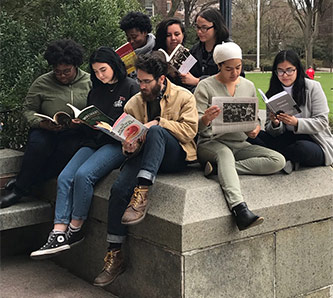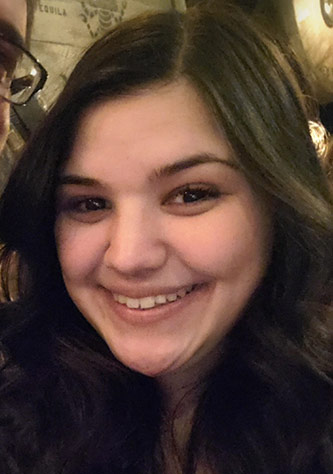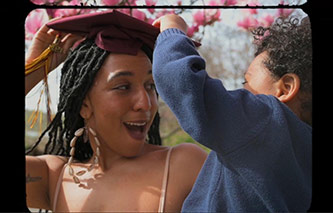HSS Student Advisory Board

Former members of the HSS Student Advisory Board
The HSS Student Advisory Board (SAB) is a group of students nominated from the nineteen programs and departments within HSS who meet regularly with Dean Gould to discuss matters of shared concern and voice their opinions on school policies. The SAB was formed by the Dean in the fall semester of 2018, as it became clear that more student involvement was needed to chart the school’s vision, goals, and priorities. In terms of its composition, each department chairperson and program director in the school is asked to recommend one student to serve on the SAB, and another student to serve as an alternate. The board typically has ten who regularly attend. This academic year, more than 60% of the students are seniors, while juniors and sophomores make up the remaining 40%, with the most popular major being Communications. As the Dean explained, the purpose of the SAB is to “provide routine, systematic student input on matters concerning the School, to be a direct channel for student concerns to the dean, and to advise the dean on priorities and initiatives, and to keep me in touch with the student body.” Dean Gould pointed out that such direct student input is especially important during those semesters that he is not teaching in the classroom. Over the years, the HSS SAB has recommended numerous initiatives to foster better communication between the students and administration and how to make the college a better educational environment for students.
A survey given to the SAB members revealed a number of things about how and why they joined the board, and what they thought of their role. The majority of the board members found their way to the SAB through a recommendation or nomination by a professor. Leading up to their decision to join, was wanting to become active in Brooklyn College’s community and wanting to voice their opinions on relevant issues. They were not shy about expressing their advice regarding how to better the school community as a whole. One of the suggestions offered by the students to make a difference in their learning outcomes was that, “...professors need to be encouraged to take training courses about how to use Blackboard and Zoom in order to properly facilitate a class.”
The survey responses indicated that being a part of the advisory board has taught the students a great deal, as they are able to apply their experience to their daily lives as well. Some students said, “I learned that working together with people is the most efficient way to accomplish things. I really look forward to attending future meetings and being a part of a larger community.” And “I'm not alone with my thoughts about changes for Brooklyn College.” Over 100% of students would recommend others to join the advisory board as well, so both their voices can be heard, and be active in the school community. Certainly, the students felt that the school community needs to improve by, “Advertising the departments and, “… encouraging extracurricular involvement.”

Michelle Ciccone, Student Advisory Board member

Assata Gonzalez, Student Advisory Board member
One key theme that SAB members have come back to time and again is an appeal for better communication across campus. They have urged the Dean to come up with effective ways to share information about campus events, clubs, speakers, and opportunities for free or discounted access to NYC institutions for all students. Several of the SAB student recommendations have been put into effect, such as an increased use of Instagram and Twitter. Their request for expanded research opportunities for HSS students is at least partially addressed by this year’s expanded funding tor the Mellon Transfer Students Research Program (MTSRP).
Other ideas SAB students proposed for better and clearer communication but which have not yet been put into effect include information kiosks on the quads, flat screens at building entrances, a single login for all BC websites, a consolidation of information systems, as well as a tab on the BC website for clubs and club events. The students suggested creating a map of the campus that identifies the locations of key services, organizations and spaces for students. And they thought that the map should be paired with a guide to student and community services available on campus. They advised that many students are not aware that the Women’s Center, LGBTQIA space, meditation space, food pantry, farm share, and other campus amenities and services exist, or where they are located. In this case, some changes to BC Navigator were made after proposing that such details be added.
Besides better communication to students about what BC has to offer and what events are going on, the students have put forward other ideas to improve the college experience for their fellow students. For example, the SAB has recommended a Common First Year Experience, i.e., a class or cluster of classes that all new BC students would take focused on the history and culture of the surrounding community. They also recommended holding a graduate school fair specifically geared for HSS departments/programs and in general more effective graduate school preparation and information sharing. They also suggested more cross CUNY events and opportunities, starting with building connections with Medgar Evers. The students have suggested the administration explore options for the restoration of the campus bookstore because they want a place to purchase BC themed merchandise and get the books they need when they need them. They want chairs not to schedule classes during common hours, since that time is students’ opportunity to participate in campus culture.
These suggestions are taken very seriously by the Dean and form part of the justification for supporting any initiatives he may offer if they were either initiated or endorsed by the Student Advisory Board members. Each of the above concerns were communicated by the Dean to the relevant administrators and to the HSS Leadership Team. Vice President Ron Jackson’s office has been particularly receptive and responsive to student suggestions. The HSS SAB has also met with VP Ron Jackson to discuss plans for commencement and orientation during the pandemic.
The HSS SAB has played an especially critical role during the lockdown in keeping the Dean aware and attuned to the student experience of the pandemic, both in online courses and in their daily lives. For example, the SAB advised the Dean on the distribution of the Kitch Connectivity Grants designed to assist students with the hardware and funds they need to do their school work remotely. As the Dean explained, “Much of my thinking about how to advise Chairs, Directors, Faculty and other Administrators has been shaped by my conversations with the HSS Student Advisory Board.”






